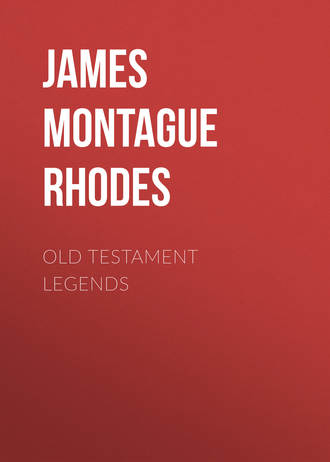
Old Testament Legends
Then he commanded the angels, and they brake down the corners of the wall and loosened the foundations, and made weak the fastenings of the gates; and after that a great voice sounded out of the temple, saying, "Enter, ye enemies, and come in, ye adversaries; for He that kept the house hath departed from it." And the angels went up again into heaven. But Jeremiah and Baruch went into the temple, and took the vessels of the sanctuary and delivered them to the earth, as they were commanded; and forthwith the earth opened her mouth and swallowed them up. And for the rest of that night they wept and lamented; and in the morning Jeremiah called for Ebedmelech and said to him, "Take a basket and go to the vineyard of Agrippa, and fetch me some figs, that I may give them to the sick and needy among the people; and the blessing of God go with thee." And Ebedmelech set forth.
On that same morning the host of the Chaldeans surrounded the city, and a trumpet sounded in heaven, and they came against the city; and the gates gave way before them, and the wall fell, and they entered the city and laid it desolate, and took the people captive. But Jeremiah took the keys of the temple, and went outside the city and threw them up towards the sun, saying, "O sun, I say unto thee, take these keys and keep them until God shall require them of thee; for we are not found worthy to keep them any longer." And they vanished out of his sight. Then he returned, and the Chaldeans took him prisoner and carried him away to Babylon. But Baruch fled, and took refuge in a tomb, and there he remained in great sorrow of heart.
Now Ebedmelech had gathered the figs, and filled his basket; and by the time he had finished, the day had become burning hot. So he sat him down under a tree to rest a little, and then laid his head on the basket of figs and fell into a slumber. And he slept for sixty-six years without waking.
And when the sixty-six years were over, and the time of deliverance of the children of Israel was near, Ebedmelech woke up, and said to himself, "I should have been glad to sleep a little longer, for my head is still heavy; I have not slept my sleep out." And he uncovered his basket and looked at the figs, and saw that they were oozing with juice; and said again, "Well, I should like to sleep yet a little, but I am afraid I may oversleep myself; and if I do, father Jeremiah will be disappointed; for if he had not been in haste for the figs, he would not have sent me out so early." So he rose and picked up his basket of figs and put it on his shoulder, and went back to Jerusalem. When he came near the city he could not recognise it, and when he had entered the gate he could not either find his own house or see any of his acquaintance. He said therefore within himself, "Some strange delusion has come upon me; I have missed my way in coming over the hills: it must be that I was not fully awake. This will be a wonderful thing to tell Jeremiah when I meet with him." And he went out of the city. But when he looked back upon it, he could see that it was indeed Jerusalem; and he said, "It is surely the city, yet there is something wrong." He went into the city the second time, but he could find none that knew him. And he said, "God preserve me! Verily a delusion has fallen upon me," and went outside the city and sat down with the basket of figs, saying, "Here will I sit until my eyes are opened, and I can discern the truth." After some time he saw an old man coming from the fields, and said to him, "Old man, what is this city, I pray you?" The old man said, "It is Jerusalem." Ebedmelech said, "Where are Jeremiah the prophet and Baruch the scribe?" The old man answered, "You are certainly not of this city, that you inquire concerning these men. Jeremiah is in Babylon with the people that were carried away captive by Nebuchadnezzar the king." Then Ebedmelech marvelled and said, "If you were not an aged man, whom it is not lawful to mock, I should have said you were mad. How many hours is it, think you, since Jeremiah sent me to the garden of Agrippa for some figs for the sick people, and I went and gathered them and slumbered for a little under a tree, and have just now brought them back; and here they are with the juice oozing from them, just as when I picked them; and you say the people and Jeremiah are gone to Babylon!" And he opened the basket and showed the figs. And when the old man saw them he said, "Verily, my son, God has had mercy on you. He has spared you from seeing the desolation of the city. Behold, to-day it is sixty-and-six years since the people were carried away. And, if you believe not me, look upon the trees and see that it is not the time of figs." Then Ebedmelech asked, "What then is this month, and what is the day?" And he answered, "It is the twelfth day of Nisan." And Ebedmelech believed, and gave thanks to God; and after that he gave the old man some of the figs, and bade him farewell, saying, "May God guide thee to the Jerusalem which is above." And he went to find Baruch.
And after a while he found him dwelling in a tomb; and they greeted one another, and rejoiced, and Ebedmelech told Baruch all that had happened to him, and Baruch marvelled and praised God. Then they consulted how they might send word to Jeremiah at Babylon; for they perceived that the time of the return of Israel was at hand. And it was revealed to them that on the morrow at dawn there should come a messenger whom they might send.
On the morrow, therefore, Baruch rose early and went out of the tomb, and saw an eagle sitting upon a rock hard by; and he called to it and it came, and spoke with a man's voice, saying, "I am sent hither to bear a message for thee." Baruch said, "Canst thou carry a letter to Babylon, to Jeremiah the prophet?" And the eagle said, "To that end am I sent." So they wrote a letter, and took fifteen of the figs from the basket and hung them on the eagle's neck; and Baruch blessed it, saying, "I say unto thee, O king of the birds, go in peace, and bring back an answer to me. Be not like the raven, which Noah sent out, and it returned no more to the ark; but be like the dove, which returned the third day with an answer of peace. And if the birds of the air come against thee, fight with them, and the power of God be with thee. Turn neither to the right hand nor to the left, but go straight as an arrow in the strength of the Most High."
Then the eagle flew and rested not till it came to Babylon; and there it perched upon a tree in a desert place outside the city, and waited until Jeremiah and some of the people passed by, carrying a dead man to burial. And it rose up and lighted upon the bier of the dead man, and he revived. And the eagle said to Jeremiah, "Gather the people together, and take the letter which is upon my neck, and read it in their ears." And he did so; and the people rejoiced, because the time of their deliverance was at hand. Then Jeremiah wrote a letter to Baruch, and put it upon the eagle's neck. And he blessed the eagle, and sent it away; but the figs he gave to the sick among the people. And the eagle returned to Jerusalem, and gave the letter to Baruch; and when he read it he wept, because Jeremiah had written in it all the afflictions which the people suffered at the hands of the Chaldeans.
Now when the time was fulfilled, the people were set free from Babylon, and returned to Jerusalem. And when they came back, they rejoiced and gave thanks for their deliverance for nine days. And on the tenth day Jeremiah stood up before all of them and sang a hymn of praise; and when he had ended it, he fell on the ground and became as one dead. When they saw that, Baruch and Ebed-melech lifted up their voices and wept, saying, "Our father Jeremiah, the priest of God, is departed from us!" And all the people ran together and saw Jeremiah lying as dead; and they rent their clothes and bewailed him, and then made ready to bury him. But there came a voice, saying, "Bury not the living." And at that they left off preparing a sepulchre for him, and waited, keeping watch about his body, till he should revive again.
And after three days the spirit of Jeremiah returned to him again, and he rose up and prophesied; and in his prophecy he said, "There shall be a Tree set up, which shall make the barren trees fruitful, and the proud and fruitful trees barren; and the snow shall be turned to blackness, and the sweet waters become bitter, and the scarlet shall be white as wool. Moreover, He shall bless the isles that they shall bear fruit by the word of His mouth; and He shall satisfy the hungry souls." And thereafter he began to speak to them of the coming of the Beloved into the world.
Now when the people heard it they were very angry and said, "He blasphemeth. These are the words that Isaiah spake, and they sawed him asunder with a saw of wood. Let us slay Jeremiah also, but him we will stone with stones." And Baruch and Ebedmelech cried out against them, "Do not this great wickedness!" But Jeremiah said, "Be silent, for they shall not kill me before I have delivered to you all that I have seen and heard. Fetch me a great stone." And when it was brought, Jeremiah prayed and said, "O Light of the Ages, cause this stone to appear in my likeness." And immediately the stone took upon it the likeness of Jeremiah, and the people began to stone it, believing that it was Jeremiah. And in the meantime he went on speaking to Baruch and Ebedmelech until he had committed to them all the mysteries which he had heard while he lay in a trance.
Then he arose and stood forth in the midst of the people, and the stone cried out with a loud voice, "O foolish people, why stone ye me, thinking that I am Jeremiah; and behold, he is in the midst of you!" And their eyes were opened, and they ran upon him and stoned him; and his ministry was accomplished.
But Baruch and Ebedmelech buried his body; and they took the stone and set it up over his grave, and wrote upon it, "This is the helper of Jeremiah."
AHIKAR
In the Book of Tobit in the Apocrypha you will find mention in several places of a man called Achiacharus, who was a relation of Tobit, In the first chapter (verses 21, 22) you read that he was a great officer at the court of king Esarhaddon; and at the end of the book (xiv. 10) you may learn something about his story; for Tobit says to his son Tobias, "Remember, my son, how Aman handled Achiacharus that brought him up, how out of light he brought him into darkness, and how he rewarded him again; yet Achiacharus was saved, but the other had his reward, for he went down into darkness," Then it goes on, "Manasses gave alms, and escaped the snare that was set for him, but Aman fell into the snare and perished."
Now of late years the book has come to light which tells the whole history of Achiacharus (or Ahikar, as we shall call him), and you will see as you go on that in the Book of Tobit some mistakes have been made in the names, and that instead of Aman we shall have to read Nadan, and instead of Manasses, Achiacharus.
This is the story of Ahikar. He is made to tell it himself, and he says:
When I was a young man I was steward to the great king Esarhaddon, the king of Nineveh. I was rich, and had great estates and beautiful palaces; I had everything that my heart desired, except one thing: and that was, a son. I had no child to comfort me and to inherit my great possessions after me.
Many times did I go to the temples of the gods of Nineveh and offer them sacrifices and gifts and burn incense before them; and I said, "O gods, give me a son, that I may enjoy his company while I live, and when I die he may close my eyes and bury me. And verily I am so rich that if every day from the day of my death until he died he were to take a bushel of my money and cast it away, he would not come to the end of it before his death." But the gods of Nineveh made me no answer.
Then I bethought me of the God of Israel, of whom I had learned when I was a child (for I came out of the land of the Hebrews), and I turned to Him and besought Him in like manner that He would grant me a son. And a voice came to me saying, "Forasmuch as thou hast put thy trust in false gods and sacrificed to them, thou shalt have no son. Yet this do: take thy sister's son Nadan, who is a young child, and bring him up as thine own son."
So I took Nadan and gave him to eight nurses to bring him up. He was fed on all manner of dainties, he was clothed in purple and scarlet, and slept on the softest beds. He grew up like a fair young cedar-tree; and I instructed him in all my wisdom, until I was sixty years old.
One day the king Esarhaddon returned from journeying through his kingdom, and sent for me and said, "Ahikar, my friend, my faithful and wise counsellor, you are becoming an old man. If you die, who shall succeed you and serve me in your place?" I answered, "O king, live for ever. There is with me the son of my sister, whom I have brought up as my own son, and have instructed him in all the ways of wisdom." The king said, "Go, bring him before me, and if I take pleasure in him, he shall serve me in your stead, and you can have rest from your labours, and joy and honour in your old age." So I brought Nadan to the king; and when the king saw him, he delighted in him and said, "The gods preserve you, my son!" And to me he said, "As you have served me and my father Sennacherib, so shall this youth serve me, and I will honour him and promote him for your sake." And I gave thanks to the king, and we went out, I and Nadan, from his presence. And I took Nadan home and spoke to him in private, telling him how he should conduct himself, and of what men he ought to beware, and whom he should trust. All these precepts are written in the book of Ahikar, but they are not put down here.
Now I hoped that Nadan would pay heed to my words of instruction; but when the king had exalted him, and taken him to live at the palace with him, I was grieved to see that Nadan began to become wasteful and unruly, and that, if I had suffered him, he would have squandered my money and ill-treated my servants. I admonished him, therefore, but it was in vain. He said, "My uncle Ahikar is getting old and timorous: his wisdom is failing him: one need not pay much heed to what he says." And by degrees I saw that the king began to believe Nadan, and that he no longer received me with such honour as in the old days: and this was a grief to me.
Now as I no longer had Nadan to live with me, I considered, and took his younger brother Nabu-zardan into my house. But when Nadan heard of this, he was very angry, for he thought, "Is this old man going to leave all his possessions to my younger brother, and turn me out?" So he began to think and plot how he might put me out of the way, and himself gain favour with the king.
And at last he sat down and wrote certain letters. In the first he deceitfully imitated my handwriting, and sealed it with my seal. It was written in my name to the king of Persia, saying, "From Ahikar, scribe and treasurer to Esar-haddon, king of Assyria, greeting! As soon as thou hast received this letter, set forth with thine host, and come to the plain of the south, on the 25th day of this month, and I will guide thee to Nineveh, and thou shalt take the city and possess the kingdom without any strife or battle." This letter he left lying in my chamber in the palace.
The other was written to me in the king's name, and sealed with his seal, "To Ahikar from Esarhaddon, greeting! As soon as thou receivest this letter, assemble the army, and go to the plain of the south, on the 25th day of this month; and when thou shalt see me, range the troops as if for battle, and come quickly towards me: for I have the ambassadors of the king of Egypt with me, and I desire that they should see the might of my army." This letter Nadan sent to me, and I began to make preparations as it commanded me. Thereafter Nadan took the first letter, feigning to have found it in my chamber, and brought it to king Esarhaddon. And when the king had read it, he was very angry and said, "O ye gods! what have I done to Ahikar that he should seek to betray me thus?" Nadan said, "Perhaps, my lord, it is a forgery; be not too soon disturbed; let us wait till the day appointed, and then go to the plain of the south; if Ahikar is not there, we shall know that the letter is not his; but if he is there, and armed men with him, I fear that he must indeed be conspiring against thee." And the king consented.
On the twenty-fifth day of the month, therefore, the king and Nadan set forth and rode out to the plain of the south. And I, as I had been commanded, was there with the great army which I had gathered; and so soon as I saw the king and his train approaching, I drew up the soldiers in battle array and marched quickly towards him, and the soldiers waved their weapons and shouted, and there was a great noise. Then the king was very sorely troubled, for he was sure that I had rebelled against him. But Nadan said, "Go back, my lord king, to the palace; I will capture that evil old man and bring him before you." And the king departed with his servants.
But Nadan rode up to me and said, "All that you have done is right, and well performed; the king is greatly pleased with you, and desires that you will send away the soldiers to their homes and come before him alone to receive your reward." So we rode into the city, and he brought me into the palace, where the king was seated on his throne, and all his servants about him; and I perceived that the king was in displeasure, but I knew not why. Then he put into my hand the letter which was written in my name to the king of Persia, and said, "Read that letter." And when I had read it, my knees knocked against each other, and I was speechless; I sought for a word of wisdom, but I found none. Nadan cried aloud, "O wicked and foolish old man, come forth from the presence of the king; stretch out thy hands for the cords and thy feet for the fetters!" And they bound me.
Then the king Esarhaddon turned away his face from me and spoke to Nabushemak, the chief of the executioners, who had been my friend, and said, "Take Ahikar, smite off his head, and remove it a hundred ells from his body." And I fell on my face and said, "O king, live for ever! It is thy will to slay me, yet I know that I have not sinned against thee. Now, my lord, I beseech thee, command that I may be slain before the door of my own house, and that my body may be given to my wife to be buried." And the king gave commandment accordingly.
Now as they were taking me to my house, I sent a messenger before me to my wife Ashfagni, who was a very wise woman. And she, when she heard what had happened, did not waste time in making lamentation, but hastened and prepared refreshment for Nabushemak and for the slaves that were his helpers. She came forth to meet them, and accompanied them into the house, and set food and wine before them; and the slaves drank of the wine till they were drunken and fell into a deep sleep, every one in his place.
Then I said to Nabushemak, "Do you remember how, when the father of the king delivered you to me to be put to death, I spared you because I knew that you had not done that for which you were condemned; and how, when the king learned that you were guiltless, he took you into favour again, and rewarded me? Now I swear to you that I likewise have not conspired against king Esarhaddon, but I have been falsely accused. Save me therefore; but lest the rumour should be spread abroad that I have not been put to death, do this. I have a prisoner in my house who is condemned justly to death. Take my clothes and put them upon him, and smite off his head; behold, your servants are drunken and will perceive nothing, and I will be in hiding until the day when the truth is made known."
And Nabushemak was glad—for he was my friend—and agreed; and it was done as I advised. The slaves took the prisoner and smote off his head, perceiving nothing, and gave his body to be buried instead of me; and it was published throughout all Nineveh and Assyria that Ahikar was dead.
Then Nabushemak and my wife Ashfagni made a hiding-place in the ground; it was four cubits long and three broad and five in height, and it was covered with a stone. There they hid me, and gave me bread and water to eat, secretly, and there I abode many days. But Esarhaddon was grieved in spirit, and said to Nadan, "Go to the house of Ahikar and celebrate his funeral, for he was thy uncle, and served me and my father faithfully for a long time." So Nadan came to my house; but he did not celebrate my funeral. He gathered together strange men and women, and feasted with them, and sang, and drank, and was drunken. He mocked at my wife Ashfagni, and as for my servants, who loved me and had been long in my house, he stripped them and beat them and ill-treated them until I heard the voice of their weeping and crying in my hiding-place, and I prayed the Most High to deliver us and to reward Nadan according to his works.
IINow when Pharaoh, king of Egypt, heard that I, Ahikar, was dead, he was very glad; for he had always stood in awe of my wisdom. And he wrote a letter to Esarhaddon in these words: "Pharaoh, king of Egypt, to Esarhaddon, king of Assyria, greeting! I desire to build a castle between heaven and earth. Send me therefore a wise man to whom I may commit the business. If he accomplishes all that I require and answers all my questions, I will send you by his hands the whole revenue of Egypt for three years. But if you cannot send me such a man, then you must send to me, by my messenger, the whole revenue of Assyria for three years. And if not, I shall come against you and lay your land desolate. And so farewell."
When the letter was read before Esarhaddon, he called together his princes and counsellors and wise men, and said to them, "Which of you will go to Egypt and answer the questions of Pharaoh?" They said, "Lord and king, in the time of your father it was Ahikar the scribe who answered all hard questions and solved all difficulties; and behold, now you have with you his sister's son Nadan, who has been instructed in his wisdom and can do all that you require." So the king turned to Nadan and said, "Will you go to Egypt and answer Pharaoh?" But Nadan said, "It is folly! The gods themselves could not build a castle between heaven and earth; how then should the children of men accomplish such a thing?" When the king heard that, he arose and came down from his throne, and threw himself on the ground lamenting and saying, "Alas, alas, I am undone. I have slain my servant Ahikar at the word of a foolish boy, and there is none like him left! Who can give him back to me?"
Then Nabushemak spoke and said, "O king, live for ever. He that disobeys the commandments of his master is worthy of death. Say therefore the word, and let them hang me on a tree; for Ahikar, whom you bade me slay, is not dead, but living!" The king said, "O Nabushemak, if it be as you say, and if you can show me Ahikar alive, I will give you ten thousand talents of gold and a hundred robes of purple. Say on, therefore." Nabushemak said, "One thing I ask of my lord: that he will not keep this my trespass in mind, nor store up wrath against me." And the king sware to him.
Nabushemak went forth immediately and mounted his chariot, and drove swiftly to my house. He uncovered the hiding-place and brought me forth, and took me up into his chariot and led me into the presence of the king. And when the king saw me, he wept; for I was in evil plight. My hair was grown over my shoulders, and my beard reached down to my girdle; my body was foul with dirt, and my nails were as long as eagles' claws; my eyes were dim from the darkness, and my limbs were stiff so that I could scarcely walk. And the king said, "O Ahikar, it is not I that have brought this misery upon you, but he whom you have brought up as your own son." I answered, "O king, since mine eyes have looked upon you I have no more sorrow or pain." The king said, "Go to your house, bathe your body, and cut your hair; refresh yourself and take your rest for forty days; then come back to me." And I did so. But after twenty days I had recovered my strength, and I went back to the king. Then he showed me the letter of the king of Egypt, saying, "Behold, Ahikar, the burden which they would lay upon me and upon my kingdom." And I answered, "O king, live for ever. Trouble not yourself, nor be disquieted about this matter. I will go to Egypt and answer the hard questions; and I will bring back to you the revenues of Egypt for three years." So the king was comforted; he rejoiced greatly, and made a feast, and gave me rich presents.






